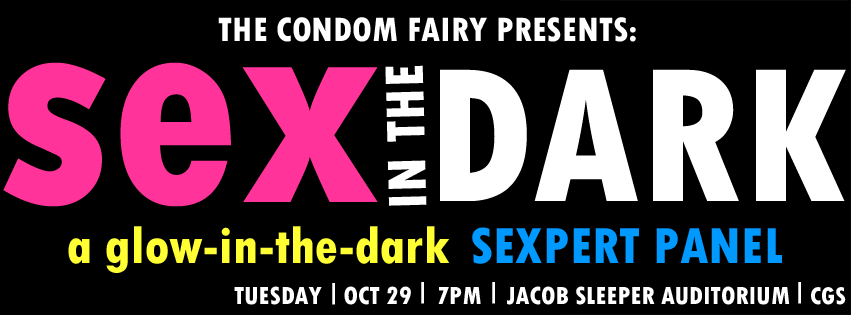
S-E-X. Sex. Why is it so difficult to talk about sex?
Biologically, our bodies’ main purpose is to successfully reproduce for future generations. However, if we are required to perpetuate our existence, why do we often find ourselves fumbling, looking the other way, or turning bright red when we openly express our sexual needs and desires?
This and more was explored at the Sex in the Dark: A Glow-in-the-Dark sex panel hosted by Boston University Student Health Services. The talk was held, in the dark, at the Jacob Sleeper Hall in CGS. The idea was that students should feel comfortable in asking anything. The panel of sexperts included Sophie Godley of the BU School of Public Health, Drs. Teri Aronowitz, Mark Weber of BU Student Health Services, and Dr. Elizabeth Boskey of the Women’s, Gender, & Sexuality Studies Program.
To entice people to come, (not that there weren’t already many college students who were eager to learn more about anything sex-related) free vibrators were given to the first 75 people who showed up. There was also the opportunity to grab a free Rhett t-shirt and glow-in-the-dark sticks. Talk about swag gifts.
As you made your way into the auditorium and settled in your seat, despite the splatter of colorful glow sticks in the dark, peoples’ faces could not be discerned. In a way, you did feel more at ease, as though you are not the only one who has these “burning” thoughts and questions.
There were 3 rounds of Q&As with skits in-between. Although the skits were a bit dry, the sex panelists had smart replies, as evident by the many applauses and snaps from the audience. There were the questions that are often asked in Sex Ed, such as “When do we need a condom?” or “What happens after you have sex?,” that may come off as trivial questions, but there were many students who really have not had any talk about sex, whether it be at school or with their parents. Therefore, the sex panelists could not stress enough how important protection is, because it is better to be safe than sorry. Who wants a child when one is still in college and has yet to start his or her career?
Then there were the more provocative questions that most students were waiting for, questions like “Why do people shave their buttholes?” that were answered in a rather knowledgeable and informative manner. The panelists responded by saying that people shave their buttholes for the same reason they shave any other parts, for the feeling of cleanliness. However, as one of the panelists warned, be careful of where you shave, because a nick in the skin, especially in that sensitive area, can easily allow for a higher risk of herpes and other sexually transmitted diseases.
Continuing on the subject about hair, people are generally disillusioned by pornography, and one of the sex panelists said that “we are so f***ed about porn.” The people in this industry tend to be hairless for the “moneyshot,” not for the reasons we may think. Whether or not you want to shave that area is a personal choice. Pornography tends to distort our vision of what sex should look and feel like.
Therefore, the representation of sex is often not a true one, as it is often driven by social and cultural factors. There is a cultural myth that “all boys want to have sex all the time and girls try to prevent it.” By stereotyping this belief, we have, in a way, come to accept it upon ourselves.
As one of the sex panlists explained, women are often concerned about their bodies because they do not know how to freely explore themselves and because they are not able to accept their bodies, they feel judged by society. However, as the sex panelists said several times throughout the talk, we need to be more comfortable with our bodies. Therefore, contrary to what people may think, masturbation is not a bad thing. The more informed we are about our bodies, the more confident we become in ourselves, and the more sex does not have to be an awkward thing.

